
TV Home / Entertainment Channel / Bullz-Eye Home
All good things must end and, certainly, our favorite television series are no exceptions to this longstanding rule. It’s really been on our mind a lot lately, given that one of the most important shows in recent memory is drawing to a close. Of course, we’re speaking of “Gilmore Girls.”
Um, we mean “The Sopranos.”
Sorry, our bad. We don’t watch “Gilmore Girls.” And we definitely don’t own the six seasons of the show that are currently available on DVD. Or the soundtrack.
Where were we?
Oh, right: “The Sopranos” is departing the airwaves, and like most diehard TV addicts, we here at Bullz-Eye are down on our knees, hoping and praying that the series finale lives up to the legacy that David Chase has created for the show over the course of these six seasons. It’s also gotten us to reminiscing about other departed series…in particular, which ones met the challenge of providing just the right amount of closure to leave their fans happy, and which ones failed miserably at the task. Your mileage may vary when you’re presented with our selections, but, hey, we can’t watch everything!
NOTE: We shouldn't have to tell you that there are major spoilers ahead, but better safe than sorry, no? If you haven't seen the finales below and you plan on doing so at some point, stop reading now!
The Howdy Doody Show
Air date: September 24, 1960 –
Nowadays, you’d never find a kid’s show doing a proper final episode; someone somewhere would claim that the studio would be throwing money away, saying, “You can’t syndicate an episode that indicates the series has ended, because the dumb kids would never tune in again, and that’s lost advertising revenue.” Back in 1960, however, “The Howdy Doody Show” decided to yank its audience’s heartstrings the same way that its show’s star had had his own strings yanked for the preceding 13 years. To set the scene for proper emotional impact, you first need to be aware that, since the very beginning of “The Howdy Doody” show, one of its constants had been that the character of Clarabell the Clown didn’t speak. During the final episode, Clarabell ran from person to person, trying to get them to read the note that he had, but everyone was in the middle of something. As the show neared its conclusion, host Buffalo Bob finally read the note, which revealed that, in fact, Clarabell could talk. “Well, go ahead: say something!” We hear a drum roll. The camera pans in on the clown, whose lip is quivering, and when the pan finally stops, Clarabell opens his mouth and softly says, “Goodbye, kids.” And the screen fades to black. Wow. – Will Harris
The Fugitive
Air date: August 29, 1967 – Ah, you kids today: you think “The Fugitive” was just a Harrison Ford movie. You watched the saga of Dr. Richard Kimble play out over the course of 130 minutes, with the one-armed man getting his just desserts and Kimble being proven innocent. But, dammit, what you don’t understand is that the movie was based on a ‘60s TV series, and back in the day, it took four years for Dr. Kimble – played by David Janssen – to finally find that mysterious one-armed man, named Fred Johnson. In the two-part series finale, Lt. Philip Gerard (Barry Morse) had captured Dr. Kimble and was transporting him back to Indiana when Kimble convinces Gerard to allow him to follow one last clue to the one-armed man’s whereabouts. It pays off, and it all leads to a tussle between Kimble and Johnson; just as Johnson’s about to kill Kimble, he’s killed by Gerard. In the end, a man who Johnson had been blackmailing comes forward and confirms Kimble’s innocence. End scene. America was so captivated by the conclusion to “The Fugitive” that it remained the single highest-rated television episode of all time until its title was usurped by the legendary “Who Shot J.R.?” episode of “Dallas.” – Will Harris
The Mary Tyler Moore Show
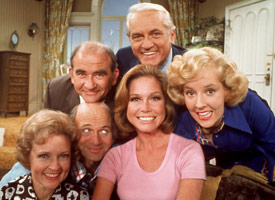 Air date: March 19, 1977 – With WJM-TV’s news ratings in the toilet, the new station manager must decide if the problem with the news is in front of the camera and can be solved by firing the station’s bumbling idiot of an anchorman, Ted Baxter, or if it’s behind the scenes, which would necessitate the firing of everyone else.. Of course, he decides to stick with Ted, ordering a complete reworking of the entire WJM news staff. As everyone packs up and makes their final goodbyes, they embrace in a group hug that none of them want to end, eventually shuffling out of the newsroom singing “It’s A Long Way To Tipperary, ” resulting in what still remains one of the greatest sitcom endings of all time. – James Eldred
Air date: March 19, 1977 – With WJM-TV’s news ratings in the toilet, the new station manager must decide if the problem with the news is in front of the camera and can be solved by firing the station’s bumbling idiot of an anchorman, Ted Baxter, or if it’s behind the scenes, which would necessitate the firing of everyone else.. Of course, he decides to stick with Ted, ordering a complete reworking of the entire WJM news staff. As everyone packs up and makes their final goodbyes, they embrace in a group hug that none of them want to end, eventually shuffling out of the newsroom singing “It’s A Long Way To Tipperary, ” resulting in what still remains one of the greatest sitcom endings of all time. – James Eldred
M*A*S*H
 Air date: February 28, 1983 – The title of this episode was “Goodbye, Farewell & Amen,” but some people have suggested that since the series lasted three times longer than the war it depicted, “good riddance” should’ve been tacked on as well. Ridiculous. I was 12 years old when this aired, and I still remember rushing home from a Boy Scouts meeting to catch it in its entirety…and I know I wasn’t the only one. If the final episode of “M*A*S*H” was a bit overlong at two and a half hours, longtime fans of the show would probably still be hard pressed to determine which subplots to cut. Every major character gets their own major storyline, some more melodramatic than others (Winchester and the musicians still feels shoehorned into the episode to me), but the actors all make the material shine as brightly as possible. The last hour is virtual perfection, with everyone’s fates being determined and all the goodbyes being said. Klinger staying in Korea was brilliant irony, but it’s the poignancy of the departures that really sticks with you. Hearing Colonel Potter’s voice break is rough, but it’s B.J.’s refusal to say goodbye to Hawkeye that provides the emotional payoff for the last shot of the series. – Will Harris
Air date: February 28, 1983 – The title of this episode was “Goodbye, Farewell & Amen,” but some people have suggested that since the series lasted three times longer than the war it depicted, “good riddance” should’ve been tacked on as well. Ridiculous. I was 12 years old when this aired, and I still remember rushing home from a Boy Scouts meeting to catch it in its entirety…and I know I wasn’t the only one. If the final episode of “M*A*S*H” was a bit overlong at two and a half hours, longtime fans of the show would probably still be hard pressed to determine which subplots to cut. Every major character gets their own major storyline, some more melodramatic than others (Winchester and the musicians still feels shoehorned into the episode to me), but the actors all make the material shine as brightly as possible. The last hour is virtual perfection, with everyone’s fates being determined and all the goodbyes being said. Klinger staying in Korea was brilliant irony, but it’s the poignancy of the departures that really sticks with you. Hearing Colonel Potter’s voice break is rough, but it’s B.J.’s refusal to say goodbye to Hawkeye that provides the emotional payoff for the last shot of the series. – Will Harris
The Young Ones
Air date: June 19, 1984 – Trying to find American viewers for an anarchic British sitcom would normally be a fool’s errand, but, thankfully, some genius at MTV decided that the audience who watched their alternative video show, “120 Minutes,” would absolutely dig “The Young Ones.” Good call, that. After two seasons of surreal comedy, however, the adventures of Neil, Vyvyan, Rick, and Mike came to a close with “Summer Holiday,” an episode which took its title from the classic single by Rick’s hero, Cliff Richard. The boys are celebrating the end of school for the summer, with Vyvyan getting his kicks by repeatedly smacking Neil and Rick over the head with a cricket bat, but the fun comes to an abrupt end when their landlord, Jerzei Belowski, kicks them out because of all the damages they’ve caused to their flat. (Tragically, when Belowski tries to sell the flat by declaring it “the wackiest house on television, and if it isn’t so, may God strike me dead,” the Lord Almighty immediately takes him up on his offer.) After a failed attempt to live on the streets, where Rick gets the words “destitute” and “prostitute” mixed up, the foursome attempt to rob a bank. Though it goes horribly wrong at first, they somehow manage to escape with a major haul, departing the scene on a double-decker bus to the soundtrack of…you guessed it: “Summer Holiday.” Sadly, however, the bus rams into a billboard bearing Cliff Richard’s face and goes careening off a cliff. After tumbling and crashing to the ground, we hear a voiceover of the boys saying en masse, “Whew, that was a close one!” And then the bus explodes. Bloody brilliant. – Will Harris
St. Elsewhere
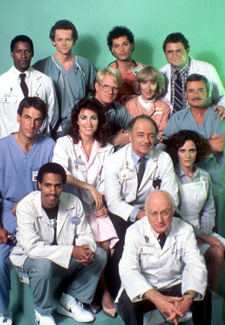 Air date: May 25, 1988 – How do you conclude one of the most influential hour dramas of all time, one that daringly blended drama, black comedy and social commentary? How do you conclude a show that helped launch the careers of David Morse, Denzel Washington and helped establish Howie Mandel as…what’s this? A respectable dramatic actor…? (No, seriously, it really did.) How do you conclude a show that explored the AIDS epidemic not only through the eyes of patients but also through a doctor (Mark Harmon) who’d contracted it through his constant sexual trysts, yet still has the sense of humor to show Dr. Donald Westphal (Ed Flanders), in his last act as a regular character, mooning his boss (Ronnie Cox)? Leave that to the show’s creators: Mark Tinker, who’s gone on to write, direct or produce such important pieces of pop culture as “L.A. Law” and “NYPD Blue,” and Tom Fontana, the creative genius behind “Homicide: Life on The Streets” and “Oz.” Directed by Bruce Paltrow (a.k.a. Gwenyth’s dad), the last episode found everything you knew about the series collapsing like a house of cards via a provocative last scene that still has people talking about it today. The show had been winding down a storyline about an evil conglomerate taking over the previously-public hospital and ruining the care while trying to make a profit, but, suddenly, it was suggested that everything that had happened in the six year run was, in fact, nothing but the imaginings of a young austistic boy named Tommy. We see Ed Flanders…but he’s not a doctor; he’s Tommy’s construction-worker father. And we see Norman Lloyd, but he’s not Dr. Auschlander, the patriarch of St. Eligius and the mentor of Flanders’ character; he’s Tommy’s grandfather. Instead of snow falling around the hospital, we’re in the gritty apartment of a working family…but the last shot features Tommy staring at a snow globe with a model of St. Eligius inside. Lloyd’s final, rhetorical question to Flanders: “Tommy’s locked inside his own world, staring at that toy all day long. What does he think about?” Apparently, he dreams up one of the greatest medical dramas of all time… –R. David Smola
Air date: May 25, 1988 – How do you conclude one of the most influential hour dramas of all time, one that daringly blended drama, black comedy and social commentary? How do you conclude a show that helped launch the careers of David Morse, Denzel Washington and helped establish Howie Mandel as…what’s this? A respectable dramatic actor…? (No, seriously, it really did.) How do you conclude a show that explored the AIDS epidemic not only through the eyes of patients but also through a doctor (Mark Harmon) who’d contracted it through his constant sexual trysts, yet still has the sense of humor to show Dr. Donald Westphal (Ed Flanders), in his last act as a regular character, mooning his boss (Ronnie Cox)? Leave that to the show’s creators: Mark Tinker, who’s gone on to write, direct or produce such important pieces of pop culture as “L.A. Law” and “NYPD Blue,” and Tom Fontana, the creative genius behind “Homicide: Life on The Streets” and “Oz.” Directed by Bruce Paltrow (a.k.a. Gwenyth’s dad), the last episode found everything you knew about the series collapsing like a house of cards via a provocative last scene that still has people talking about it today. The show had been winding down a storyline about an evil conglomerate taking over the previously-public hospital and ruining the care while trying to make a profit, but, suddenly, it was suggested that everything that had happened in the six year run was, in fact, nothing but the imaginings of a young austistic boy named Tommy. We see Ed Flanders…but he’s not a doctor; he’s Tommy’s construction-worker father. And we see Norman Lloyd, but he’s not Dr. Auschlander, the patriarch of St. Eligius and the mentor of Flanders’ character; he’s Tommy’s grandfather. Instead of snow falling around the hospital, we’re in the gritty apartment of a working family…but the last shot features Tommy staring at a snow globe with a model of St. Eligius inside. Lloyd’s final, rhetorical question to Flanders: “Tommy’s locked inside his own world, staring at that toy all day long. What does he think about?” Apparently, he dreams up one of the greatest medical dramas of all time… –R. David Smola
Newhart
Air date: May 21, 1990 – Everybody knows this one, and everyone expects it to be here, so predictable or not, here it is. Why? Because it truly is the gold standard of TV finales. After seven years of running the Stratford Inn in Vermont, Dick Loudon (Bob Newhart) and his wife, Joanna (Mary Frann), find themselves the only people in town who refuse to sell their property to a Japanese tycoon who wants to turn the entire town into a huge golf resort. After five years of having the inn bombarded with golf balls, Dick steps onto his front porch and is promptly knocked unconscious by one. When he wakes up, he’s in bed with…Suzanne Pleshette? Yep. Turns out the entire “Newhart” series was just a dream that was had by Chicago psychologist Bob Hartley. According to Newhart, people have told him that they were watching the episode alone in a hotel room and still leapt to their feet, yelling, “Yes! YES!” You can hardly blame them; TV Guide rightfully rated it the most unexpected moment in TV history. – Will Harris
The Tonight Show Starring Johnny Carson
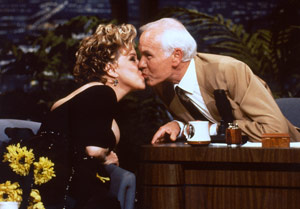 Air date: May 21, 1992 – The final proper episode of “The Tonight Show Starring Johnny Carson” was his second-to-last (the actual final episode was mostly a clip show), and it had just two guests: Robin Williams and Bette Midler. Williams’ nonstop manic pace had Johnny Carson in near-hysterics for the entire hour, and it remains one of the best appearances by a celebrity in talk show history. Midler’s performance of “One for My Baby (And One More for the Road)” came dangerously close to appearing over-sentimental, but the real tears of Carson and Midler as the song came to a close made the eyes of even the most jaded, cynical bastard out there get a little misty. If this episode wasn’t enough to make you realize that you were going to miss Carson…well, the subsequent 14 years of Leno have probably done the trick. (Editor’s note: it’s worth mentioning that the last few minutes of Carson’s actual episode, when he was speaking directly to the viewers at home, managed to top the Midler moment by providing a classy and heartfelt farewell from a true TV legend.) – James Eldred
Air date: May 21, 1992 – The final proper episode of “The Tonight Show Starring Johnny Carson” was his second-to-last (the actual final episode was mostly a clip show), and it had just two guests: Robin Williams and Bette Midler. Williams’ nonstop manic pace had Johnny Carson in near-hysterics for the entire hour, and it remains one of the best appearances by a celebrity in talk show history. Midler’s performance of “One for My Baby (And One More for the Road)” came dangerously close to appearing over-sentimental, but the real tears of Carson and Midler as the song came to a close made the eyes of even the most jaded, cynical bastard out there get a little misty. If this episode wasn’t enough to make you realize that you were going to miss Carson…well, the subsequent 14 years of Leno have probably done the trick. (Editor’s note: it’s worth mentioning that the last few minutes of Carson’s actual episode, when he was speaking directly to the viewers at home, managed to top the Midler moment by providing a classy and heartfelt farewell from a true TV legend.) – James Eldred
Quantum Leap
Air date: May 4, 1993 – Usually, ambiguous endings only serve to frustrate an audience looking for closure. In the case of “Quantum Leap,” the mysterious nature of the series finale served to remind viewers what made the show so great in the first place. Sam Beckett, the time traveler who “leaps” into other people’s bodies in order to right wrongs, seemingly leaps into himself and wanders into a strange bar where everyone is oddly similar to people Sam previously leaped into. Oh, right, and the bartender just might be God. The episode wasn’t initially intended to be a series finale, but changes made in the editing room somehow allowed the series to go out on a high note, even if it really didn’t answer any of the lingering questions from the Quantum Leap experiment. Maybe that’s because there weren’t any answers to give…? – James Eldred
Wonder Years
Air date: May 12, 1993 – During the final moments of the two-part finale for “The Wonder Years,” Daniel Stern’s familiar voice tells us that Kevin’s buddy Paul studied law at Harvard, his sister moved to Alaska with her hubby (David Schwimmer), his mom became a successful businesswoman, his dad died two years later, and his bullying older brother Wayne took over the family business. But the heart and soul of the finale and the series was Kevin’s rocky relationship with Winnie Cooper. Winnie was spending the summer working as a lifeguard in some ritzy out-of-town resort and, when Kevin pays her a surprise visit, he learns that she’s fallen for one of her fellow lifeguards. After confronting Winnie, Kevin punches her new friend in the face and then heads out of town…only to wind up hitching a ride with an old couple who’d already picked Winnie up after she was fired from her job. More bickering ensues and the couple, apparently not as invested in the Kevin/Winnie relationship as we were, boots the kids from their car. Cue the torrential thunderstorm, which leads Kevin and Winnie to seek shelter in a nearby barn, which leads to an emotional heart-to-heart, which leads to a passionate kiss, which leads to…well, we’re not sure if the kiss led to anything else. What we do know is that Kevin and Winnie don’t wind up spending happily ever after together, as much as we may have wanted them to; adult Kevin tells us that she went away to study art in Paris and when she returned years later, he met her at the airport with his wife and son. “Growing up happens in a heartbeat,” Stern concludes. “One day you're in diapers, the next day you're gone. But the memories of childhood stay with you for the long haul.” – Jamey Codding
Cheers
Air date: May 20, 1993 – Eleven years after its premiere, “Cheers,” the ongoing saga of a bunch of barflies and the bartenders who love them, ended in much the same way it had begun: with its focus on Sam Malone and Diane Chambers. The final episode begins with the gang at Cheers watching an awards show when they see Diane (Shelly Long) receiving an award for writing a TV miniseries. Seeing his old flame again (Long had left the show at the end of its fifth season) spurs Sam to get back in contact with her; when Diane reveals that she’s now married with children, Sam – never one to allow himself to be one-upped – claims the same. Sam ends the conversation with an offhanded suggestion that Diane bring her husband and kids by the bar the next time she’s in Boston…so, of course, Diane proceeds to show up the very next day, forcing Sam to enlist Rebecca (Kirstie Alley) to pretend to be his wife. Only Diane’s lying too, and by episode’s end, it looks like the couple is going to spend the rest of their lives together, but at the last moment, Sam realizes that he already has his one true love: Cheers. Aw! Elsewhere, Woody finds out that fatherhood is impending and is elected to the city council, Norm gets a new job, Cliff gets a promotion, and Rebecca marries Don the Plumber (Tom Berenger) and lives happily ever after…ostensibly, anyway. The show ends with Sam turning off the lights and saying to the poor sod waiting outside the door of Cheers, “Sorry, we’re closed.” The episode’s been tarnished somewhat by the fact that the cast appeared on “The Tonight Show” immediately after it aired, drunk off their collective asses, but it still provides a nice, sentimental end to longtime fans of the show. – Will Harris
Late Night with David Letterman
Air date: June 25, 1993 – Given how badly NBC had screwed him over by refusing to give him “The Tonight Show” (despite the fact that he was Johnny Carson’s personal preference), it was no real surprise that David Letterman would accept CBS’s offer for an 11:30 timeslot…but it wasn’t an easy decision for Letterman, as anyone who’s read Bill Carter’s awesome book, The Late Shift, already knows. Still, when Dave departed NBC for greener pastures, he could at least feel comfortable knowing that he’d left his mark…particularly during his last 60 minutes. Not only was Tom Hanks his primary guest, but he’d managed to secure a musical guest who’d eluded him throughout every other episode of his run: Bruce Springsteen. Still, it was his last moments that summed his feelings up best, when he bid his audience and network adieu, hopped upon a horse, and literally rode into the sunset…to the strains of “We Gotta Get Out Of This Place.” – Will Harris
Star Trek: The Next Generation
Air date: May 24, 1994 – The original “Star Trek” was cancelled abruptly and never had the luxury of a series finale; instead of going out with a similar whimper, however, “Star Trek: The Next Generation” ended with one hell of a poignant bang. Captain Jean Luc Picard (Patrick Stewart) once again becomes the plaything of the essentially-omnipotent Q (John de Lancie), who has him stumbling through time, trying to solve a puzzling mystery that seems to be going chronologically backwards. If Picard doesn’t find out what’s going on, Q tells him that he’s going to end all of humanity. While exploring his own past and one possible future fate of the crew of the Enterprise, Picard figures out Q’s riddle and sacrifices himself in each of the timelines in order to save humanity. This was all part of Q’s plan, of course, and after Picard successfully proves his (and by extension, all of humanity’s) worth, all of the damage is undone and Picard is taken back to present time, as if nothing had ever happened. Some would say this was the last great episode of “Trek” to grace TV, as the various series to follow in its wake simply have not compared to the travels of Picard and crew. – James Eldred
Seinfeld
 Air date: May 14, 1998 – Most people were disappointed at the finale of “Seinfeld,” possibly because it ended with Jerry, Kramer, George and Elaine going to jail for not reporting a mugging that they’d witnessed in a small New England town. But what was so brilliant about this episode is that no one saw it coming. Yes, the finale was hyped to no end – maybe more so than any sitcom in history – but it was great for more than one reason. First of all, there were a few minutes during which their private plane was going down when they started spewing confessions to each other, and one of those was George admitting that he cheated on “The Contest.” When the plane straightened out, the four found themselves in a small town, witnessing the crime and demonstrating just how insensitive their characters were by joking about it, a tendency which had always been a central premise of the series. Then they brought back a series of familiar faces…the marble rye lady, Babu, the virgin woman, and Sidra (Teri Hatcher’s “they’re real and they’re spectacular” character)… to testify against the foursome in court. It was like Larry David and Seinfeld were summing the whole series up in one episode…and, in the end, the main characters finally paid their karmic debt. – Mike Farley
Air date: May 14, 1998 – Most people were disappointed at the finale of “Seinfeld,” possibly because it ended with Jerry, Kramer, George and Elaine going to jail for not reporting a mugging that they’d witnessed in a small New England town. But what was so brilliant about this episode is that no one saw it coming. Yes, the finale was hyped to no end – maybe more so than any sitcom in history – but it was great for more than one reason. First of all, there were a few minutes during which their private plane was going down when they started spewing confessions to each other, and one of those was George admitting that he cheated on “The Contest.” When the plane straightened out, the four found themselves in a small town, witnessing the crime and demonstrating just how insensitive their characters were by joking about it, a tendency which had always been a central premise of the series. Then they brought back a series of familiar faces…the marble rye lady, Babu, the virgin woman, and Sidra (Teri Hatcher’s “they’re real and they’re spectacular” character)… to testify against the foursome in court. It was like Larry David and Seinfeld were summing the whole series up in one episode…and, in the end, the main characters finally paid their karmic debt. – Mike Farley
(Editor’s note: Yes, we know, just about everybody else in the free world was disappointed by the “Seinfeld” finale. Thing is, we offered our writers the opportunity to do a point-counterpoint on the episode, so that someone could give it a good thrashing, but nobody took us up on it! So here’s what we’re wondering: if no one hated it enough to actually spew a paragraph’s worth of venom in its general direction, is it possible that…gasp!...it wasn’t nearly as bad as we all originally thought it was?)
Homicide: Life On The Street
 Air date: May 21, 1999 – Consistently one of the best shows on television that damn near no one ever watched, “Homicide: Life On The Street” spent nearly its entire seven season run on the brink of cancellation. With the axe constantly looming, the creators must have had plenty of time to think of ways to end the series on a moment’s notice, and it showed with the series haunting finale, entitled “Forgive Us Our Trespasses.” The series began with young Detective Bayliss investigating an impossible to solve murder of an 11 year old girl; appropriately, it ended with him facing the unpleasant reality that a serial killer he caught red-handed would be getting off without a trial because of a legal technicality. With his world collapsing around him and his purpose in life seemingly shattered, Bayliss resigns from the force and follows the killer to his new home, where he seemingly murders him in cold blood. “Homicide” always showed the ugly, morally-grey world of police officers, and this episode did it better than any other. While more intense shows like “NYPD Blue” and “The Shield” have been more successful in showing the ambiguous world of law enforcement, none have been able to cover the subject matter that “Homicide” did without appearing exploitive or needlessly brutal. Though this finale would’ve served well enough as an epitaph, the following year brought the show a television movie which served as the definitive conclusion to the series, successfully managing to bring back everyone that ever served in Baltimore’s homicide division during the show’s run, even the guys who had died. – James Eldred
Air date: May 21, 1999 – Consistently one of the best shows on television that damn near no one ever watched, “Homicide: Life On The Street” spent nearly its entire seven season run on the brink of cancellation. With the axe constantly looming, the creators must have had plenty of time to think of ways to end the series on a moment’s notice, and it showed with the series haunting finale, entitled “Forgive Us Our Trespasses.” The series began with young Detective Bayliss investigating an impossible to solve murder of an 11 year old girl; appropriately, it ended with him facing the unpleasant reality that a serial killer he caught red-handed would be getting off without a trial because of a legal technicality. With his world collapsing around him and his purpose in life seemingly shattered, Bayliss resigns from the force and follows the killer to his new home, where he seemingly murders him in cold blood. “Homicide” always showed the ugly, morally-grey world of police officers, and this episode did it better than any other. While more intense shows like “NYPD Blue” and “The Shield” have been more successful in showing the ambiguous world of law enforcement, none have been able to cover the subject matter that “Homicide” did without appearing exploitive or needlessly brutal. Though this finale would’ve served well enough as an epitaph, the following year brought the show a television movie which served as the definitive conclusion to the series, successfully managing to bring back everyone that ever served in Baltimore’s homicide division during the show’s run, even the guys who had died. – James Eldred
Mad About You
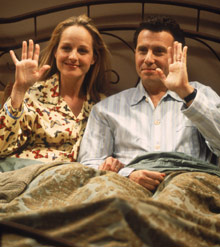 Air date: May 24, 1999 – “Mad About You” was a show that lasted just a couple of seasons too long. Many thought the show should’ve ended when it was revealed that Jamie and Paul were finally going to have a baby, or, at the very latest, the end of the next season when Jamie gave birth to their daughter Mabel. But, alas, they decided to keep going well past the point of no return. It was surprising, then, that when the show finally decided to give it up, it went out with an amazingly satisfying and emotionally powerful episode that reminded everyone why they’d originally liked “Mad About You” so much. Presented as a film by their now grown-up daughter Mabel, we see Paul and Jamie’s marriage deteriorate to the point of them splitting up and then rebound after some very successful scheming by their daughter. This finale showed the ups and downs of marriage in a realistic and hysterical way…just like the show did when it was in its prime. – James Eldred
Air date: May 24, 1999 – “Mad About You” was a show that lasted just a couple of seasons too long. Many thought the show should’ve ended when it was revealed that Jamie and Paul were finally going to have a baby, or, at the very latest, the end of the next season when Jamie gave birth to their daughter Mabel. But, alas, they decided to keep going well past the point of no return. It was surprising, then, that when the show finally decided to give it up, it went out with an amazingly satisfying and emotionally powerful episode that reminded everyone why they’d originally liked “Mad About You” so much. Presented as a film by their now grown-up daughter Mabel, we see Paul and Jamie’s marriage deteriorate to the point of them splitting up and then rebound after some very successful scheming by their daughter. This finale showed the ups and downs of marriage in a realistic and hysterical way…just like the show did when it was in its prime. – James Eldred
Buffy the Vampire Slayer
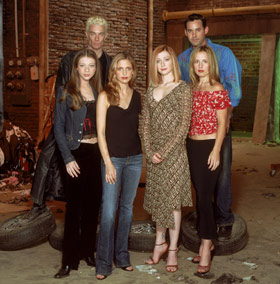 Air date: May 20, 2003 – With the possible exception of “Angel,” the series finale of “Buffy the Vampire Slayer” might be the greatest non-ending in TV history. Buffy spends the entire season having her authority and abilities, as both a Slayer and a high school guidance counselor, challenged by anyone and everyone. The First – as in “the first evil to walk the earth” – wants to host a big housewarming party at the Seal of Danthalzar which, natch, is located underneath the new Sunnydale High School. Buffy decides to crash the party before the ink is dry on the invitations, and she brings every potential Slayer – each of them now an actual Slayer, thanks to witchy gal pal Willow’s mojo – as her dates. The fight is ugly, to say the least: most of the Slayers bite it, the newly-mortal vengeance demon Anya is sliced in half, and the vampire Spike’s soul serves as the fuse for a supernatural neutron bomb that turns the entire town of Sunnydale into a smoking hole in the ground. As the Scoobies sit on the outskirts of town staring at the wreckage, Buffy’s sister Dawn asks, “Buffy? What are we gonna do now?” Buffy, never one to miss a snappy comeback, merely reveals the slightest hint of a smile. Evil is by no means vanquished, but for the first time in seven years, Buffy Summers’ work is done. It does not offer much in the way of a definitive resolution, but as Marge Simpson once said, “It’s an ending. That’s enough.” - David Medsker
Air date: May 20, 2003 – With the possible exception of “Angel,” the series finale of “Buffy the Vampire Slayer” might be the greatest non-ending in TV history. Buffy spends the entire season having her authority and abilities, as both a Slayer and a high school guidance counselor, challenged by anyone and everyone. The First – as in “the first evil to walk the earth” – wants to host a big housewarming party at the Seal of Danthalzar which, natch, is located underneath the new Sunnydale High School. Buffy decides to crash the party before the ink is dry on the invitations, and she brings every potential Slayer – each of them now an actual Slayer, thanks to witchy gal pal Willow’s mojo – as her dates. The fight is ugly, to say the least: most of the Slayers bite it, the newly-mortal vengeance demon Anya is sliced in half, and the vampire Spike’s soul serves as the fuse for a supernatural neutron bomb that turns the entire town of Sunnydale into a smoking hole in the ground. As the Scoobies sit on the outskirts of town staring at the wreckage, Buffy’s sister Dawn asks, “Buffy? What are we gonna do now?” Buffy, never one to miss a snappy comeback, merely reveals the slightest hint of a smile. Evil is by no means vanquished, but for the first time in seven years, Buffy Summers’ work is done. It does not offer much in the way of a definitive resolution, but as Marge Simpson once said, “It’s an ending. That’s enough.” - David Medsker
Angel
Air date: May 19, 2004 – As previously mentioned, it’s a neck-and-neck race in the field of “greatest non-ending in TV history” between “Angel” and the show that originally sired it, “Buffy the Vampire Slayer.” Creator Joss Whedon took this spin-off and gave it a unique identity and feel, and fans ate it up; unfortunately, the ratings didn’t match their devotion, and the show struggled for life. After a last-second reprieve at the end of the fourth season, there wasn’t much chance for survival beyond Season 5, so Whedon did his damndest to provide an ending that was simultaneously ambiguous and definitive. With Angel preparing to betray the members of the Circle of the Black Thorn – and, in turn, the entire law firm of Wolfram & Hart – his longtime buds are, as ever, by his side. Angel instructs his wrecking crew to “live the day like it’s your last…because it probably is.” So how does the gang go out? Angel goes to visit his estranged son, Conor. Gunn goes to visit his old friend, Anne, and spends the day helping at the homeless shelter she runs. Wesley and Illyria have a heart to heart talk that foreshadows events later in the episode. Spike gets drunk and reads some of his excruciatingly bad poetry. And Lorne…? Lorne does what he does best: he sings karaoke…specifically, “If I Ruled the World.” Flash-forward several hours, and it’s time for several back-to-back sequences of serious ass-kicking. Angel and Spike win their respective rounds, and Lorne takes one more for the team before retiring from the game, saying that it isn’t his fight any longer, but, unfortunately, everyone doesn’t come out victorious. Wesley is killed, and his death scene, with Illyria taking on the form of Fred to make his final moments blissful, is a major tearjerker, and although Gunn wins his battle, he incurs a wound that looks potentially mortal. Still, he leaps into the final demonic fray alongside his fellow survivors…and as Angel steps forward and says, “Let’s go to work,” the series ends. Did they survive? Does it really matter? The battle against evil wages on nonetheless, and either way, you know with certainty that Angel and his pals put up a good fight ‘til the bitter end. – Will Harris
Everybody Loves Raymond
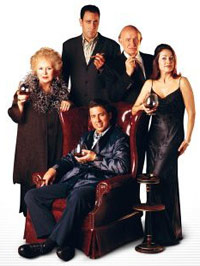 Air date: May 16, 2005 – After nine seasons and a lot of bickering between various family members, “Everybody Loves Raymond” ended on a very surprising and tender note. The finale started with Ray Romano’s character, Ray Barone, getting a case of tonsillitis and having to have surgery for the first time in his life. Everyone told him the surgery was no big deal, but Ray was reluctant. As the whole family sat in the waiting room at the hospital, viewers of the show held their collective breath when a doctor emerged to notify the family that Ray hadn’t woken up from the anesthesia. For a couple of minutes, a family that’d spent their lives constantly sniping at each other was suddenly drawn together by the fact that they all feared the worst: that Ray wasn’t going to wake up at all. But before very long, another doctor emerged to reveal that Ray had woken up and was fine, and it felt as though the family would be looking at each other differently from then on…as if this moment had finally made them appreciate each other. It was such a simple ending, yet so powerful at the same time. Particular kudos, however, should go to the producers for keeping everyone’s fears about Ray’s fate short-lived, rather than have it linger throughout the episode. – Mike Farley
Air date: May 16, 2005 – After nine seasons and a lot of bickering between various family members, “Everybody Loves Raymond” ended on a very surprising and tender note. The finale started with Ray Romano’s character, Ray Barone, getting a case of tonsillitis and having to have surgery for the first time in his life. Everyone told him the surgery was no big deal, but Ray was reluctant. As the whole family sat in the waiting room at the hospital, viewers of the show held their collective breath when a doctor emerged to notify the family that Ray hadn’t woken up from the anesthesia. For a couple of minutes, a family that’d spent their lives constantly sniping at each other was suddenly drawn together by the fact that they all feared the worst: that Ray wasn’t going to wake up at all. But before very long, another doctor emerged to reveal that Ray had woken up and was fine, and it felt as though the family would be looking at each other differently from then on…as if this moment had finally made them appreciate each other. It was such a simple ending, yet so powerful at the same time. Particular kudos, however, should go to the producers for keeping everyone’s fears about Ray’s fate short-lived, rather than have it linger throughout the episode. – Mike Farley
Six Feet Under
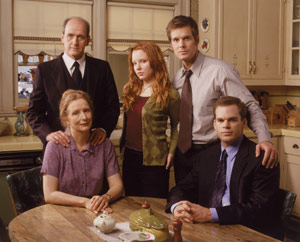 Air date: August 21, 2005 – When the “Six Feet Under” finale aired, it took some heat from critics for wrapping up every major character’s storyline by showing how, when and where they died. Maybe those critics weren’t watching the series from the beginning. This was, after all, a show about a family owned funeral home, a show that so brilliantly and poignantly illustrated how fragile life can be and how cruelly ironic death can be. Nate Fisher, Ruth and Nathaniel Fisher’s oldest child, spent his life trying to escape death, only to wind up suffering a fatal brain hemorrhage after cheating on his pregnant wife with his Quaker step-sister. Yikes. In the finale, Nate’s family is still reeling from his sudden death, but in the second half of the 75-minute episode, they all begin to discover their own sense of closure: Ruth finds joy in her grandchildren, Nate’s brother David turns his family’s old funeral home into a new home for his partner and their two adopted children, and even after her job offer from a stock photography company in New York falls through, Claire, the baby of the family, heads east anyway, away from LA, away from her warped art school friends, away from the death her brother Nate never could elude. As she drives, we see the characters we’d watched for five years take their last breaths, one at a time, with Sia’s “Breathe Me” providing a hauntingly beautiful backdrop. There may not have been a more fitting way to close out the show, critics be damned. – Jamey Codding
Air date: August 21, 2005 – When the “Six Feet Under” finale aired, it took some heat from critics for wrapping up every major character’s storyline by showing how, when and where they died. Maybe those critics weren’t watching the series from the beginning. This was, after all, a show about a family owned funeral home, a show that so brilliantly and poignantly illustrated how fragile life can be and how cruelly ironic death can be. Nate Fisher, Ruth and Nathaniel Fisher’s oldest child, spent his life trying to escape death, only to wind up suffering a fatal brain hemorrhage after cheating on his pregnant wife with his Quaker step-sister. Yikes. In the finale, Nate’s family is still reeling from his sudden death, but in the second half of the 75-minute episode, they all begin to discover their own sense of closure: Ruth finds joy in her grandchildren, Nate’s brother David turns his family’s old funeral home into a new home for his partner and their two adopted children, and even after her job offer from a stock photography company in New York falls through, Claire, the baby of the family, heads east anyway, away from LA, away from her warped art school friends, away from the death her brother Nate never could elude. As she drives, we see the characters we’d watched for five years take their last breaths, one at a time, with Sia’s “Breathe Me” providing a hauntingly beautiful backdrop. There may not have been a more fitting way to close out the show, critics be damned. – Jamey Codding
Arrested Development
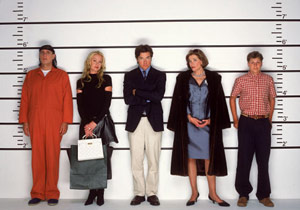 Air date: February 10, 2006 – “Arrested Development” may have been booted off the air well before its time, but at least we got a proper series finale, something that can’t be said of many other prematurely cancelled shows. Aptly titled “Development Arrested,” the episode found the Bluth family back where it all started: on a yacht, celebrating the induction of Michael as the company’s new CEO. Of course, the boat trip wasn’t the only case of deja vu from the pilot episode. Michael has a father-son discussion with George Michael about what the most important thing is (except this time he is talking about breakfast), Lucille is arrested in place of George Sr., and, instead of staying around to help, Michael leaves the family for a much-needed vacation in Cabo. Continuing a season-long tradition of firing back at FOX for axing a show that had just won an Emmy for Best Comedy Series, the writers packed the finale with several hidden references – from the cost of an average episode ($2 million, or the value of the company shares) to the duration of the show (53 weeks, or how long George Michael has been obsessed with Maeby) – and tied up as many loose ends as possible. Lucille sells the company to Sitwell, Lindsay’s true identity is revealed (thus making George Michael’s secret crush that much less creepy), and, in the ultimate series finale curveball, Annyong (or “Hello,” in English) – who’s seeking revenge on the Bluths for stealing his grandfather’s idea for a banana stand – surfaces as the mole who tipped off the feds. In one word: brilliant. – Jason Zingale
Air date: February 10, 2006 – “Arrested Development” may have been booted off the air well before its time, but at least we got a proper series finale, something that can’t be said of many other prematurely cancelled shows. Aptly titled “Development Arrested,” the episode found the Bluth family back where it all started: on a yacht, celebrating the induction of Michael as the company’s new CEO. Of course, the boat trip wasn’t the only case of deja vu from the pilot episode. Michael has a father-son discussion with George Michael about what the most important thing is (except this time he is talking about breakfast), Lucille is arrested in place of George Sr., and, instead of staying around to help, Michael leaves the family for a much-needed vacation in Cabo. Continuing a season-long tradition of firing back at FOX for axing a show that had just won an Emmy for Best Comedy Series, the writers packed the finale with several hidden references – from the cost of an average episode ($2 million, or the value of the company shares) to the duration of the show (53 weeks, or how long George Michael has been obsessed with Maeby) – and tied up as many loose ends as possible. Lucille sells the company to Sitwell, Lindsay’s true identity is revealed (thus making George Michael’s secret crush that much less creepy), and, in the ultimate series finale curveball, Annyong (or “Hello,” in English) – who’s seeking revenge on the Bluths for stealing his grandfather’s idea for a banana stand – surfaces as the mole who tipped off the feds. In one word: brilliant. – Jason Zingale
The West Wing
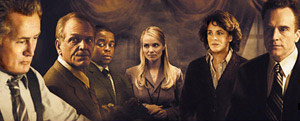 Air date: May 14, 2006 – After seven seasons of political drama and personal humor, “The West Wing” finally said goodbye. At one point, the show was so popular with people on both sides of the aisle that if Jed Bartlet (Martin Sheen) had joined the 2004 Presidential campaign, he would have probably won in a landslide. In subsequent years, the ratings slipped, and NBC had the good sense to give the creators enough forewarning to end the show properly. The fans needed two things: (1) to know that the Presidency would be in good hands and (2) that every character that we grew to love would have a suitable future. We already knew that the thoughtful Democrat Matt Santos (Jimmy Smits) would be the next President, and in a show of bi-partisanship that apparently can only happen in Hollywood, he asked conservative Arnold Vinick (Alan Alda) to be his Chief of Staff. The finale was relaxed and bittersweet, as many of the main characters said goodbye to the White House. The most touching scene focused on the father/son relationship between President Bartlet and Charlie (Dule Hill). (Jed gave Charlie a copy of the Constitution that his father gave him, a tearful scene if there ever was one.) The series’ two long-standing romances (Josh/Donna and CJ/Danny) looked to be poised for good things, but the big question mark was the future of Toby Zeigler (Richard Schiff), who had gotten himself into some serious legal trouble by leaking classified military information in order to save three astronauts in a previous episode. Throughout the episode, Barlet hemmed and hawed over signing his pardon, but in the end, he finally did. The final scene provided the perfect ending: Bartlet alone, after the Santos’ inauguration, opening up a package that contained a cocktail napkin that his old friend Leo (the late John Spencer) had given him almost a decade earlier. It read, “Bartlet for America.” – John Paulsen
Air date: May 14, 2006 – After seven seasons of political drama and personal humor, “The West Wing” finally said goodbye. At one point, the show was so popular with people on both sides of the aisle that if Jed Bartlet (Martin Sheen) had joined the 2004 Presidential campaign, he would have probably won in a landslide. In subsequent years, the ratings slipped, and NBC had the good sense to give the creators enough forewarning to end the show properly. The fans needed two things: (1) to know that the Presidency would be in good hands and (2) that every character that we grew to love would have a suitable future. We already knew that the thoughtful Democrat Matt Santos (Jimmy Smits) would be the next President, and in a show of bi-partisanship that apparently can only happen in Hollywood, he asked conservative Arnold Vinick (Alan Alda) to be his Chief of Staff. The finale was relaxed and bittersweet, as many of the main characters said goodbye to the White House. The most touching scene focused on the father/son relationship between President Bartlet and Charlie (Dule Hill). (Jed gave Charlie a copy of the Constitution that his father gave him, a tearful scene if there ever was one.) The series’ two long-standing romances (Josh/Donna and CJ/Danny) looked to be poised for good things, but the big question mark was the future of Toby Zeigler (Richard Schiff), who had gotten himself into some serious legal trouble by leaking classified military information in order to save three astronauts in a previous episode. Throughout the episode, Barlet hemmed and hawed over signing his pardon, but in the end, he finally did. The final scene provided the perfect ending: Bartlet alone, after the Santos’ inauguration, opening up a package that contained a cocktail napkin that his old friend Leo (the late John Spencer) had given him almost a decade earlier. It read, “Bartlet for America.” – John Paulsen
Some Not-So-Favorites
Soap
 Air date: April 20, 1981 – During its all too brief run, “Soap” tackled then-controversial topics like homosexuality, interracial marriage, infidelity, and ventriloquism. Each year, the show seemed to get crazier and crazier, and by the end of the fourth season, Burt (Richard Mulligan) was set-up for a seeming assassination by his political enemies, Chester (Robert Mandan) was going to kill Danny (Ted Wass) and then himself, and Jessica (Katherine Helmond) was about to be executed by South American revolutionaries. And that’s where they’ve been ever since, as the show was never picked up for a fifth season! – James Eldred
Air date: April 20, 1981 – During its all too brief run, “Soap” tackled then-controversial topics like homosexuality, interracial marriage, infidelity, and ventriloquism. Each year, the show seemed to get crazier and crazier, and by the end of the fourth season, Burt (Richard Mulligan) was set-up for a seeming assassination by his political enemies, Chester (Robert Mandan) was going to kill Danny (Ted Wass) and then himself, and Jessica (Katherine Helmond) was about to be executed by South American revolutionaries. And that’s where they’ve been ever since, as the show was never picked up for a fifth season! – James Eldred
Dallas
Air date: May 3, 1991 – Dallas peaked with its second season finale, which had the whole damn world wondering “Who shot J.R.?” Twelve bloated seasons (and one disastrous dream sequence) later, J.R. (Larry Hagman) was still alive and coming to the sad realization that everyone around him probably wished Kristin Shepard (Mary Crosby) would have finished the job back in 1980. Contemplating suicide, J.R. is visited by an angel (Joel Grey) who does the whole “It’s A Wonderful Life” bit on him, showing him what the world would’ve been like if he was never born. J.R. Ewing is no George Bailey, however, and this mysterious figure is no Clarence; he shows that Dallas sans J.R. might be better off without him. After subjecting J.R. to this alternate reality, the angel shows his true colors and reveals himself to be a demon from hell who wants J.R. to shoot himself in the head. The camera cuts away as J.R. pulls the trigger, causing a shocked Bobby Ewing (Patrick Duffy) to run in the room and exclaim, “Oh, my God!” The end. The series’ bizarre decision to descend into the realm of the paranormal for the finale was totally out of character for a show that kept itself pretty well grounded in the real world (as prime-time soaps go). While the cliffhanger was eventually resolved in a series of TV movies (if you’re wondering, he shot the mirror), it served as an unjust insult to the series loyal fans that stood by it for 14 long seasons. I mean, my dad invested more time in this show than either of his marriages! – James Eldred
Twin Peaks
Air date: June 10, 1991 – We tackled this not so terribly long ago, in our review of the second and final season of “Twin Peaks,” but it’s worth going over it again here. Despite the fact that the show’s ratings had gone into a freefall following the resolution of the mystery of who killed Laura Palmer, surely the “Twin Peaks” fans who’d stuck it out ‘til the bitter end deserved better than this. As the final episode ended, we were left with multiple cliffhangers about the fates of several main characters, including Audrey Horne (Sherilyn Fenn), Pete Martell (Jack Nance), and Annie Blackburn (Heather Graham), but nothing was as irksome as the way FBI Agent Dale Cooper was left. After a desperate trip into the mystical Black Lodge in order to defeat his former partner, the crazed Windom Earle (Kenneth Welsh), and save the aforementioned Annie, Cooper returned to the real world – such as it is when you’re talking about Twin Peaks – and it’s revealed that he’s been possessed by the evil spirit known as Bob (Frank Silva). “Cooper” rams his head into the bathroom mirror and repeats in a madman’s voice, “Where’s Annie?” Cue the closing credits. Say whaaaaaaat? Yep. That was all she wrote for “Twin Peaks.” Okay, to be fair, Lynch didn’t even want to reveal who’d killed Laura Palmer (he wanted the mystery to remained unsolved forever), but this was just cruel and unusual punishment. God willing, someday I’ll interview Lynch and ask him if he’d worked out Coop’s final fate in his head…but for now, I’m still pissed about that goddamned ending. – Will Harris
Beverly Hills 90210
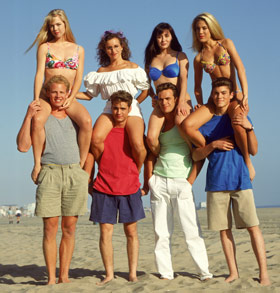 Air date: May 17, 2000 – Donna (Tori Spelling) and David (Brian Austin Green) get married. Yeah, right. Kelly (Jennie Garth) and Dylan (Luke Perry) start over again. Yeah, right. Brandon (Jason Priestly) refuses to have anything to do with the entire episode, but sends video messages to both the bachelor and bachelorette parties. (Okay, that one we’ll buy.) Steve (Ian Ziering) tells Janet (Lindsay Price) to…aw, please: nobody cares about Steve. For a show that went from a teen issues drama to a relationship-driven soap opera, a change inspired by the success of its spinoff, “Melrose Place,” the unbearably syrupy ending to “Beverly Hills 90210” betrayed everything the show may have ever represented at one point or another during its 11-year-run. It doesn’t appear that the writers once asked themselves, “What would Brenda do?” Perhaps that’s because they knew that her answer would be, “Set everyone on fire.” While that may not have made for the most ideal series finale, it would have been a hell of a lot more interesting than the one they ultimately came up with. – David Medsker
Air date: May 17, 2000 – Donna (Tori Spelling) and David (Brian Austin Green) get married. Yeah, right. Kelly (Jennie Garth) and Dylan (Luke Perry) start over again. Yeah, right. Brandon (Jason Priestly) refuses to have anything to do with the entire episode, but sends video messages to both the bachelor and bachelorette parties. (Okay, that one we’ll buy.) Steve (Ian Ziering) tells Janet (Lindsay Price) to…aw, please: nobody cares about Steve. For a show that went from a teen issues drama to a relationship-driven soap opera, a change inspired by the success of its spinoff, “Melrose Place,” the unbearably syrupy ending to “Beverly Hills 90210” betrayed everything the show may have ever represented at one point or another during its 11-year-run. It doesn’t appear that the writers once asked themselves, “What would Brenda do?” Perhaps that’s because they knew that her answer would be, “Set everyone on fire.” While that may not have made for the most ideal series finale, it would have been a hell of a lot more interesting than the one they ultimately came up with. – David Medsker
Star Trek: Enterprise
 Air date: May 13, 2005 – Pity poor “Enterprise.” As it stands right now, its four-season run makes it the least-successful member of the “Trek” franchise since the original show. It’s a shame that it ended when it did; the series, which provided a look back at the early years of Starfleet Command and the path to the founding of the United Federation of Planets, had finally gotten into a serious groove during its fourth season, thanks in no small part to the writing of Judith and Garfeld Reeves-Stevens. Unfortunately, the finale seemed designed not to spotlight how far “Enterprise” had come but, rather, how little its characters meant to the show’s executive producers. In what can only be described as a misbegotten gimmick designed to score big ratings rather than provide a proper send-off, it was decided that the events of the final episode – which take place six years after the penultimate episode – should be framed as being a holodeck recreation by Commander Riker (Jonathan Frakes) and Counselor Troi (Martina Sirtis), from “Star Trek: The Next Generation.” It was wholly inappropriate, unnecessary, and ultimately only served to remove the focus from the characters we’d seen develop over the preceding four years. – Will Harris
Air date: May 13, 2005 – Pity poor “Enterprise.” As it stands right now, its four-season run makes it the least-successful member of the “Trek” franchise since the original show. It’s a shame that it ended when it did; the series, which provided a look back at the early years of Starfleet Command and the path to the founding of the United Federation of Planets, had finally gotten into a serious groove during its fourth season, thanks in no small part to the writing of Judith and Garfeld Reeves-Stevens. Unfortunately, the finale seemed designed not to spotlight how far “Enterprise” had come but, rather, how little its characters meant to the show’s executive producers. In what can only be described as a misbegotten gimmick designed to score big ratings rather than provide a proper send-off, it was decided that the events of the final episode – which take place six years after the penultimate episode – should be framed as being a holodeck recreation by Commander Riker (Jonathan Frakes) and Counselor Troi (Martina Sirtis), from “Star Trek: The Next Generation.” It was wholly inappropriate, unnecessary, and ultimately only served to remove the focus from the characters we’d seen develop over the preceding four years. – Will Harris






